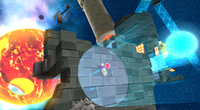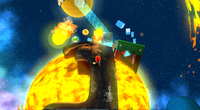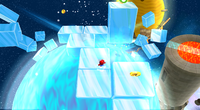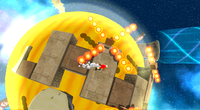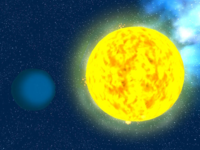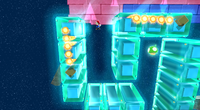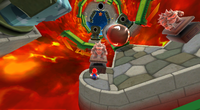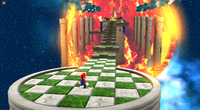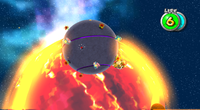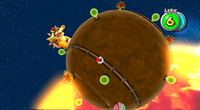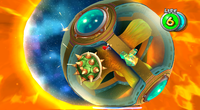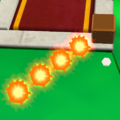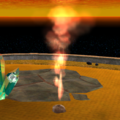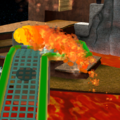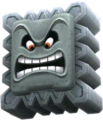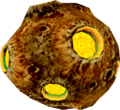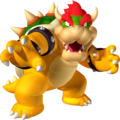Bowser's Galaxy Reactor: Difference between revisions
Nintendo101 (talk | contribs) |
|||
| Line 43: | Line 43: | ||
===Space Junk Area=== | ===Space Junk Area=== | ||
[[File:Bowser Galaxy Reactor Space Junk Area.png|200px|thumb|left|{{conjectural|Space Junk Area|area}}]] | [[File:Bowser Galaxy Reactor Space Junk Area.png|200px|thumb|left|{{conjectural|Space Junk Area|area}}]] | ||
These are | These are [[cosmic block]]s that float around space, but when Mario gets close to them, the glowing blocks begin to appear beneath Mario's feet, which forms a path for him to continue. If Mario stays on the platform for too long, it will disappear. He must also deal with alterations in the gravity's direction, and time his movements to avoid Firebars. | ||
{{br}} | {{br}} | ||
Revision as of 13:54, January 4, 2025
- Not to be confused with Bowser's Galaxy Generator or Bowser's Star Reactor.
| Bowser's Galaxy Reactor | |
|---|---|
 
| |
| Area | Comet Observatory |
| How to unlock | Get 60 stars and complete Darkness on the Horizon |
| Boss(es) | Bowser |
| Mission(s) | The Fate of the Universe |
| Stars | |
| Galaxy icon | None |
- “Finally! You got here just in time to see the creation of my galaxy in the center of the universe! WATCH AND WEEP! From this galaxy, I'll rule a great galactic empire with Peach by my side. It will last forever! I will rule every pitiful corner of the universe. So, Mario/Luigi, as you can see, I got big plans. And stomping you is at the top of my list!”
- —Bowser, Super Mario Galaxy
Bowser's Galaxy Reactor is the final galaxy in Super Mario Galaxy. It is located in the center of the universe and can be accessed only by talking to Rosalina on the Comet Observatory. After the player talks to her, she will transform the observatory into a comet and fly it to the center of the universe, with very minor resistance along the way. It is the only galaxy with a single star to have its own music.
This is where the final Grand Star is located and, as such, features the final battle between Mario and Bowser. During the battle, Bowser Jr. watches from the sidelines on his airship while holding Princess Peach captive. After defeating Bowser, one of the planets near his large sun implodes and turns into a supermassive black hole, causing the entire galaxy to collapse in upon itself, after which it begins to suck up the entire universe, along with Peach's Castle and the Comet Observatory as well. The Lumas all throw themselves into the black hole to reverse its effects and prevent the destruction of the universe. Afterwards, the galaxy is reformed, and Mario, Peach, Bowser, and many others land safely back in the Mushroom Kingdom.
Planets/Areas
The titles of the following subsections are conjectural unless otherwise noted; an official name for each section's subject has not been found, so it has been given a fitting title by the editors. If an acceptable name is found for a given section, then that section should be changed to the new title.
Starting Area
This is the first area that Mario encounters after entering the Warp Field inside Peach's Castle. The extensive vertical walls of this strange area appear to be part of a crumbling castle. This particular section of the level contains special gravity spotlights which allow Mario to walk directly up the vertical walls when the gravity field of the spotlights is entered. Several Dry Bones also patrol the area, and can trip Mario if he is not careful.
Lava Planet
This planet is the first of three-element planets that are encountered one after another. The planet itself is made completely of lava, though it does have multiple steel platforms rising out of the lava, along with moving sections of cooled lava which form moving pathways across the diameter of the planet. The steel platforms on the planet will begin to sink down into the lava as soon as Mario sets foot on them. The only significant obstacles that Mario will face on this planet (aside from the sinking platforms) are Lava Bubbles and Lava Steams. A few coins can be found on certain parts of the planet, along with a 1-Up Mushroom.
Ice sphere
The ice sphere[1] is similar and seemingly larger than the previous planet Mario visits, except that it is made out of ice instead of lava. It has Ice Blocks that create a path across its frozen surface. The Ice Blocks last for about six seconds before they disappear, meaning that they must be navigated quickly. The ice surface of the planet acts like lava, just like fatally cold water found in Snowman's Land of Super Mario 64.
Sand Planet
This planet also appears to be larger than the previous planet and is the last element planet, but is made of sand. To get across this planet, Mario must follow moving stone paths to avoid Fire Bars and quicksand that results in instant death. In this sense, it is rather similar to the Lava Planet, as both planets involve a narrow, moving pathway with a deadly substance making up the remainder of the surface and fire-based obstacles. Three tornadoes can also be found here, although they are of no use to Mario, for they only lead to his death.
Lava and Water Planets
These are two unreachable planets off to the side of the element planets. One is completely made of water, and the other is made of lava.
Space Junk Area
These are cosmic blocks that float around space, but when Mario gets close to them, the glowing blocks begin to appear beneath Mario's feet, which forms a path for him to continue. If Mario stays on the platform for too long, it will disappear. He must also deal with alterations in the gravity's direction, and time his movements to avoid Firebars.
Lava Tower Planet
This planet is a cylinder resembling a castle tower, though the inside is walled with lava. This planet has Bullet Bills, Banzai Bills, and Thwomps. Mario must travel to the end to reach the Launch Star using moving and sinking platforms while avoiding all enemies and obstacles with limited cover and a sparse supply of coins. Mario can lure Bullet Bills into Bowser Statues for coins there. The walls of the planet have their own gravity. There is also a hidden black hole found behind and above the planet.
Stairway
This is the pathway toward the battle between Mario and Bowser. It consists of a flight of stairs. There are two side platforms that contain a Life Mushroom and a 1-Up Mushroom on the left and the right of the stairs respectively. If Mario wishes to get there, he must do it quickly or the path will crumble when Bowser Jr. shoots meteors from his airship.
Bowser's Rock Planet
This is the first planet is where the first stage of the final battle takes place. It has prickly plants growing on the surface. Mario can have Bowser crush the plants to get Star Bits and coins.
Bowser's Shell Planet
This is the second planet where the second stage of the final battle takes place. It has prickly plants and rubbery bulbs growing on the surface of it. Mario can have Bowser crush the prickly plants or spin the rubbery bulbs into the prickly plants to get Star Bits or coins.
What appears to be this planet is shown exploding in the ending cutscene of the game, expanding until it becomes a black hole.
Galaxy Reactor
This last planet is where the third and final stage of the final battle takes place. It has coin lamps and ice crystals containing coins on the surface. The reactor is surrounded by a sphere of lava that makes up the massive sun of Bowser's galaxy. The final Grand Star of the game is hidden inside the reactor. The sphere of lava, however, is not solid.
Enemies
Bowser (boss)
Mission
This galaxy contains only the following mission.
| Mission | Image | Summary
|
|---|---|---|
| The Fate of the Universe | 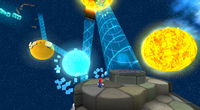 |
This mission's objective is to navigate through the Galaxy Reactor and defeat Bowser for the final time. |
Gallery
Music
The music that plays is an arrangement of Flying Mario's theme and the game's main theme. It also plays in the Grandmaster Galaxy mission "The Perfect Run" from Super Mario Galaxy 2, along with Gusty Garden Galaxy's theme, Good Egg Galaxy's theme, and the Comet Observatory theme.
| File info |
Names in other languages
| Language | Name | Meaning | Notes |
|---|---|---|---|
| Chinese | 酷霸王银河工厂[?] Kùbàwáng yínhé gōngchǎng |
Bowser's Galaxy Factory | |
| French | Usine Galactique[?] | Galactic plant | |
| French (NOE) | Usine galactique[?] | Galactic plant | |
| German | Bowsers Galaxiefabrik[?] | Bowser's Galaxy Factory | |
| Italian | Regno Galattico di Bowser[?] | Bowser's Galactic Kingdom | |
| Korean | 쿠파 갤럭시 플랜트[?] Kupa Gaelleoksi Peullaenteu |
Bowser's Galaxy Plant | |
| Spanish | Dimensión Galáctica de Bowser[?] | Bowser's Galactic Dimension |
Trivia
- On the Sand Planet, it is possible for the player to reach the tornadoes by long jumping off the moving platform and Star Spinning at the ending height of Mario's long jump. The tornadoes do nothing good for the player and can occasionally launch the player into space, making Mario lose a life.
- In the Super Mario 3D All-Stars version of Super Mario Galaxy, the heat-distortion effect in the lava tower only covers a small portion of the screen.
References
- ^ Black, Fletcher (November 9, 2007). Super Mario Galaxy PRIMA Official Game Guide. Prima Games (American English). ISBN 978-0-7615-5643-5. Page 299.
